The Trojan War (3)
Q42937Ilion or Troy: town in northwestern Asia Minor, famous for the legendary Trojan War, in which a coalition of Mycenaean warriors captured the city of king Priam.Homer's Iliad deals with an episode from this war.
Aethiopis
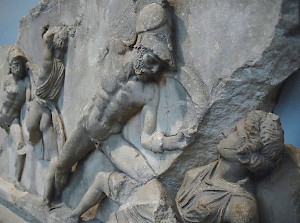
The third part of the Epic Cycle is the Aethiopis, which begins where the Iliad breaks off. Penthesileia arrives, an Amazon queen, and the daughter of the war god Ares. She turns out to be a valiant fighter, but is nevertheless killed by Achilles. The Trojans bury their ally.
One of the common soldiers, Thersites, who had already played an unheroic role in the Iliad, remarks that Achilles has been in love with the Amazon queen. That there was an element of truth in this accusation, is suggested by many representations, which show Achilles and Penthesileia looking into each others eyes.
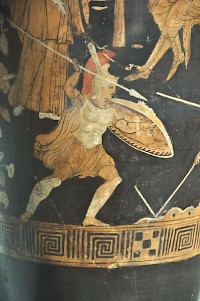
Nevertheless, it was not a clever thing to say: Achilles is really angry, and kills his critic. There is a dispute among the Greeks, because Thersites was a fellow-Greek and even though he was sharp-tongued, he ought to have been respected. Achilles is sent to the isle of Lesbos, where he has to sacrifice to Apollo, Artemis, and Leto, and is purified from bloodshed by Odysseus.
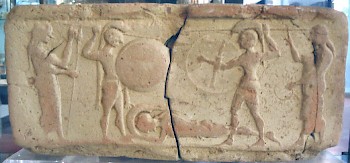
During his absence, a new Trojan ally arrives: Memnon, the son of Dawn. Like Achilles, he wears a panoply that has been made by Hephaestus. It does not help him: although he can kill the Greek warrior Antilochus, he is killed by Achilles. From representations of this scene on vases, we know that there must have been lines in the Aethiopis that describe how the fates of Achilles and Memnon were weighed by Zeus.
This turns out to be Achilles' last victory. Elated by his success, he pursues the Trojans, who flee back into their city. Achilles follows them, even passes the gate, but is shot by Paris. Ajax and Odysseus manage to recover the dead body. Thetis and the Muses arrive to mourn Achilles, and when the Greeks cremate her son, she takes his body away from the pyre and transfers it to the White Island. Still, a mound is erected, funeral games are organized, and Odysseus and Ajax start a quarrel about the panoply.
Little Iliad (Ilias Mikra)
The Little Iliad starts with the debate about Achilles' arms. Athena helps Odysseus to obtain them, and Ajax becomes mad. When he realizes that he has, in his madness, killed the sheep of the Greek army, he commits suicide.
The real story starts when Odysseus manages to capture the Trojan prince Helenus, who has the gift of prophecy, and explains that the Greeks will not take Troy without the help of Philoctetes, who is still on the isle of Tenedos. Diomedes gets Philoctetes to the Greek camp, where the physician Machaon cures the wound that the snake had made. Philoctetes immediately kills Paris, whose body is ravaged by Menelaus. Yet, the Trojans manage to recover the corpse and bury it.
The fall of Troy is now near. Odysseus leaves for Skyros, where he finds Achilles' son Neoptolemus. The young man, who had been procreated when his father visited Deidameia during the first, failed attempt to reach Troy, gets his father's arms, has a vision of Achilles, and joins the Greek army. His first act of bravery is killing Eurypylus, the son of Telephus, who had once been wounded and cured by Achilles.
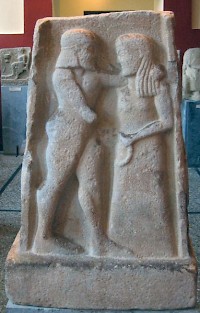
Troy can no longer hope for reinforcement, and Odysseus comes up with the idea of the Wooden Horse, which is built by Epeius, who receives instructions from Athena. To make sure that everything will go according to plan, Odysseus mutilates himself and enters Troy to spy upon his enemies. Helen recognizes him, and they agree upon a plan to hand over the city. Several Trojans, who discover what is going on, are killed, Odysseus returns to the camp, and enters Troy again with Diomedes, to take away the Palladium: a statue of Athena that protects the city. Now, the city has no defenses any more.
Fifty valiant soldiers enter the Wooden Horse, which is left on the beach, while the Greeks leave the Troad and go to Tenedos. The Little Iliad ends with the Trojans finding the Wooden Horse and towing it into their city in the mistaken belief that their troubles are finally over.
Sack of Troy (Ilioupersis)
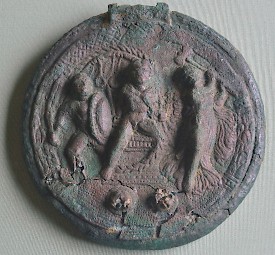
When the Trojans have brought the Wooden Horse inside their city, they wonder what to do; some want to destroy it, others want to dedicate it to Athena, and their opinion prevails. During their feasting, the Trojan priest Laocoon and his sons are killed by two snakes; Aeneas realizes that this is a bad omen, and leaves the city.
Meanwhile, the Greek spy Sinon raises a light-signal, and the Greeks on Tenedos know that they can return to Troy. When they have arrived, the fifty warriors leave the Wooden Horse, and Neoptolemus starts the massacre by killing Priam, who has fled to an altar. The son of Achilles seizes Andromache, Hector's widow, and brings her to his ship. Her son Astyanax is thrown from the walls by Odysseus.
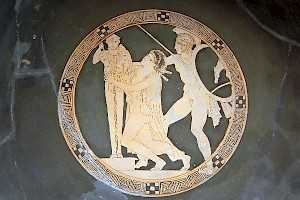
Menelaus finds Helen again, but when he sees her naked breasts, casts away his sword, and accepts her as his wife again. Ajax, son of Ileus, tries to capture Cassandra, but she finds protection from a statue of Athena; when Ajax tears her away, the statue falls, and even the Greeks find this sacrilege unacceptable. He is not stoned, however, because he himself finds protection of the same statue.
Next morning, the Greeks sacrifice a Trojan princess named Polyxena at the tomb of Achilles, and the spoils are divided.